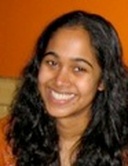Week 3: Fortune Lab Spotlight: An Interview with Richa Gawandeby Nzuekoh Nchinda Having a great mentor is key to getting the most out of an undergraduate research opportunity. At Sarah Fortune’s lab, it’s been such a wonderful experience working under Richa Gawande, a fourth year graduate student in the Biological Sciences in Public Health (BPH) program at the Harvard School of Public Health (HSPH). She was kind enough to sit with me and share the experiences that have led her to where she is today. Why the Fortune lab? “[It] gives a good balance of excitement and rigor. Straddling the basic science and translational global health line is really important to me,” Richa said. She stressed that the Fortune lab gives her a good balance between basic science, great energy in the lab, diversity of projects and translational research. Translational research is a key part of her interests because it is a way of conducting research that makes findings applicable to the population that is under study, and it encourages multi-disciplinary collaboration. Richa’s motivation for coming to HSPH is to acquire the skills to become part of a sustainable research community focused on developing settings. What experiences lead you to public health? After graduating Richa worked with Dr. Jean Fitzgerald, an HIV/TB research-physician at Cornell Medical School who leads the Center for Global Health at Cornell University and research projects at the GHESKIO clinic in Haiti. She did research on the prevalence of HPV in HIV-infected women and also helped design and maintain the center’s website, which is still being used today. “I had spent a previous summer working in India and knew that I wanted to help people in the developing world,”Richa said. “It was while working at the GHESKIO clinic in Haiti that I was able to see first-hand top-rate research being done in a developing setting. One of the amazing things about GHESKIO is that it brings rigorous training to local people so that they can build their own sustainable research community.” What was your undergraduate experience like? “I was driven by my experience in a stimulating interdisciplinary environment as an undergraduate. I had the opportunity to be part of this integrated science curriculum at Princeton. By the end of the program, I was comfortable with being at the intersect of all these different disciplines: computer science, physics, biochemistry, and biology. I wanted to bring that interdisciplinary training to my interest in global health and disease,” Richa said. The first opportunity Richa had to do this was working on her senior thesis in Dr. Lynn Enquist’s lab at Princeton University. While taking a virology course taught by Dr. Enquist, she was introduced to the fascinating world of microbes. For her thesis, she quantified the effect of herpes virus infection on mitochondrial movement in neurons. “I learned that sometimes you have to observe a system for a very long time for a very long time in order to know how to quantify it,” she said. “I think the training involved in getting a Ph.D. fits me really well. I think the Fortune lab is a perfect intersection of interdisciplinary basic science research and a focus on a disease that plagues the developing world. “ Do you feel gender has affected your scientific experience? “I haven’t felt anything was made harder because of my gender. The underrepresentation of women in math and computer science can make straddling the biology/math line difficult at times,”Richa said. Richa acknowledged that there are long-term challenges associated with being a woman in science. “If you want family to come first, you will be faced with some difficult choices, whatever career you’re in.” Where do you see yourself going? “I’m just taking it day by day. I would love to have teaching in my life, no matter what happens,” she said. Final advice? “At each juncture, make sure to listen to yourself and check in with yourself often. You will have little and big bumps, and each will teach you more about what drives you. And keep asking questions,” Richa said. About the Blogger
2 Comments
9/26/2012 09:21:43 pm
Hi! I actually added your blog to my favorites list and look forward to get the same quality content every time I visit your blog. Thanks a lot.
Reply
10/7/2012 11:39:22 pm
Your writing skills make anything interesting. I am going to apply your advice that you have mentioned in your post, they are really helpful.
Reply
Your comment will be posted after it is approved.
Leave a Reply. |
The Lab JournalWelcome to the summer internship series of 2012! Follow 9 Scientista bloggers through their summer internships to catch a glimpse of what it is like to be a scientista^TM. By Title- India Presents: A "New World Symphony"
- Through The Lens: The Intricacies Of Diabetes - Do Nanoparticles Glow? - Using Unusual Animals to Study Human Disease - Using the Hubble Telescope - You Think What You Eat - Experimenting With the Life of a Scientist(a) - 18.085: My Summer at MIT - Science Heals: A Summer of Global Health Research By BloggerRabeea Ahmed
Riana Balahadia Shaira Bhanji Nzuekoh Nchinda Amy Beth Prager Natalie Punt Juliet Snyder Pin-Wen Wang Stephanie Wang Archives |
The Scientista Foundation, Inc. All Rights Reserved © 2011-2021 | Based in NY | [email protected]
The Network for Pre-Professional Women in Science and Engineering
The Scientista Foundation is a registered 501(c)(3) -- Donate!
The Network for Pre-Professional Women in Science and Engineering
The Scientista Foundation is a registered 501(c)(3) -- Donate!



 RSS Feed
RSS Feed